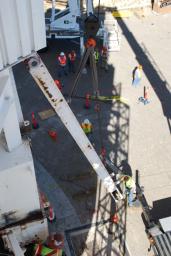
|
Mars Antenna Gets Legs
- Click the image above for a larger view
- Full-Res JPEG (2592 x 3872) (834.8 kB)
- Full-Res TIFF (2592 x 3872) (30.1 MB)
Caption:
Workers at the Deep Space Network's Goldstone Deep Space Communications Complex put into place a set of support legs to help hold up a portion of the giant "Mars antenna" on May 4, 2010. Three sets of support legs bore about 3 million kilograms (7 million pounds). They had to lift a portion of the antenna -- which included the reflector dish, instruments, counterweights and pads -- about 5 millimeters (0.2 inches) to replace the hydrostatic bearing assembly. The hydrostatic bearing assembly enables the dish to rotate horizontally.
From March to October 2010, the Deep Space Network performed a major refurbishment of the Mars antenna. The 70-meter-wide (230-foot-wide) Mars antenna got its nickname comes its first task: tracking the Mariner 4 spacecraft after its historic flyby of Mars in 1966. The antenna's official name is Deep Space Station 14.
Background Info:
JPL, a division of the California Institute of Technology in Pasadena, manages the Deep Space Network for NASA Headquarters, Washington. More information about the Deep Space Network is online at http://deepspace.jpl.nasa.gov/dsn/index.html .
Cataloging Keywords:
| Name | Value | Additional Values |
|---|---|---|
| Target | Earth | Mars |
| System | ||
| Target Type | Planet | |
| Mission | Deep Space Network (DSN) | Mariner |
| Instrument Host | Goldstone Deep Space Communications Complex (GDSCC) | |
| Host Type | Ground-Based Observatory | Flyby Spacecraft |
| Instrument | Deep Space Station 14 | Goldstone Solar System Radar |
| Detector | ||
| Extra Keywords | Color, Radar, Radio, Rotation | |
| Acquisition Date | ||
| Release Date | 2010-11-03 | |
| Date in Caption | 2010-05-04 | |
| Image Credit | NASA/JPL-Caltech | |
| Source | photojournal.jpl.nasa.gov/catalog/PIA13560 | |
| Identifier | PIA13560 | |
